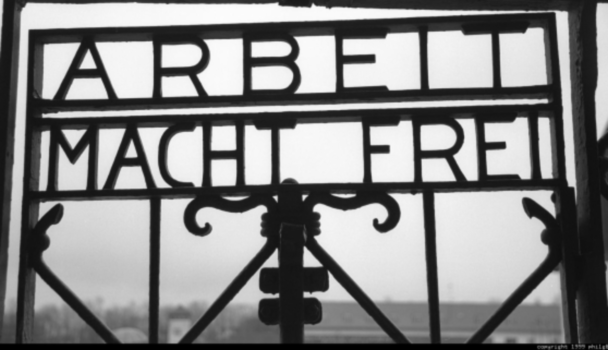By Fr. Hans Jacobse
Pascha, 2009
Every Pascha, I repost two stories on OrthodoxyToday.org. that tell how Orthodox prisoners in Dachau held the Paschal Liturgy during their liberation. The first, “The Souls of All are Aflame” provides historical background and detail. The second, “Pascha in Dachau” recounts the story of a prisoner who was there.
Dachua was liberated during Holy Week. The Orthodox believers experienced Christ’s triumph over the forces of darkness by holding a Paschal Liturgy crying out “Christ is Risen!” It is hard to fathom the depravity the evil ideologies fostered in their persecutors short of any direct experience, but anyone who has confronted lesser evils knows that such great evil can exist.
The resurrection of Christ is the final confrontation to the horrors unleashed when the embrace of Nazism and Communism opened the jaws of a deep hell. We see the seeds of horror in our own day too, especially the embrace of the nihilistic fantasies that fuel the arguments that devalue human life. It began with that faceless figure, the one who lies, who is the father of lies and appeals to the base passions of men, who whispered into the ear of man that he can be like God. Some choose to believe him. They whisper anew that first whisper. The whisper gets louder and louder so that in some corners of our world it is proclaimed from the housetops. Evil always masquerades as good, and not until the evil that those ideas hide is laid bare do most men dare face the consequences of their own beliefs. Others of course, never do.
Only the Gospel of Christ, the proclamation that Christ is risen from the dead, reveals that death is an enemy destroyed and exposes the nihilistic embrace of death as a lie. The grand schemes of the social engineers who are intoxicated by their own pride and contemptuous of what is good and true, will one day come to nothing. Babel will fall. But until it does, destruction and suffering still prevail by their hands.
How does evil flourish? Edmund Burke answered the question this way: When good men do nothing. God enters the world through a word. The Gospel of Christ, when preached with authority and by the Spirit of God, tears down strong places. “We wrestle not against flesh and blood, but against principalities and powers in the heavenly places,” writes the Apostle Paul (Eph. 6:12). Truth, spoken into the world of space and time, draws from and reveals Him who is True, and tears down the towers that men build to reach God.
But preaching the Gospel comes with a cross. The cross is the locus of transformation, the place where death is changed into life. The men in Dachau understood this. Lest the darkness overwhelm them, they instead bore the suffering of Christ in their own bodies just as the Apostle Paul teaches that we must do. They would not let go of Him who had captured them.
Christ’s victory over sin and death begins on the inside. That is where the struggle first takes place. The Apostle Paul taught us about this too. Every disciple has his Garden of Gethsemane, sometimes many in a lifetime. Yet, “I can do all things through Christ who strengthens me,” the Apostle Paul wrote while enduring a suffering of his own (Phil. 4:13). He was jailed in Philippi at the time, no small thing in the Roman empire. His suffering however, was for the sake of the Gospel and through it light entered the world.
Carrying our cross is the way that “Christ is born in us.” We should not despise our suffering, but bring our cross to Christ who enables us to carry it and through it, come to know Christ. There are no shortcuts here. “Enter by the narrow gate; for wide is the gate and broad is the way that leads to destruction, and there are many who go in by it,” Jesus said (Matt. 7:13). Death would not have been transformed to life — the gates of Hades would not have been overthrown — had Jesus not ascended the cross. That He did so voluntarily (his death was a capital murder), and that He was innocent of sin according to the Mosaic Law, is why He was able to destroy — through His death — the death to which He was condemned.
We must put to death the “…sin that reigns in our body,” the Apostle Paul teaches us (Rom. 8:13). Harsh circumstances can impose this discipline, but most of us don’t experience the level of hardship that the men in Dachau did. We also don’t see the stark contrast between life and death that the presence of real evil reveals. Sometimes we even accommodate ourselves to evil as long as it does not directly affect us. We don’t want to accept that the the first line between good and evil rests in the heart, as Solzhenitsyn said.
But, if we know that the Gospel is true, even imperfectly, then silence cannot be our lot. We have to speak what is true and do what is right, even when we know it will impose a cost. That cost can become a new cross, just like St. Paul’s imprisonment for preaching the Gospel. But, like St. Paul or the men of Dachau, carrying that cross sheds light in places where it would otherwise not be found.
Christ is Risen! Truly He is Risen!
Orthodox Christians use the word “Pascha” for Easter. Pascha is derived from Greek usage and is itself a transliteration of the Hebrew word for Passover: “Pesach.”


